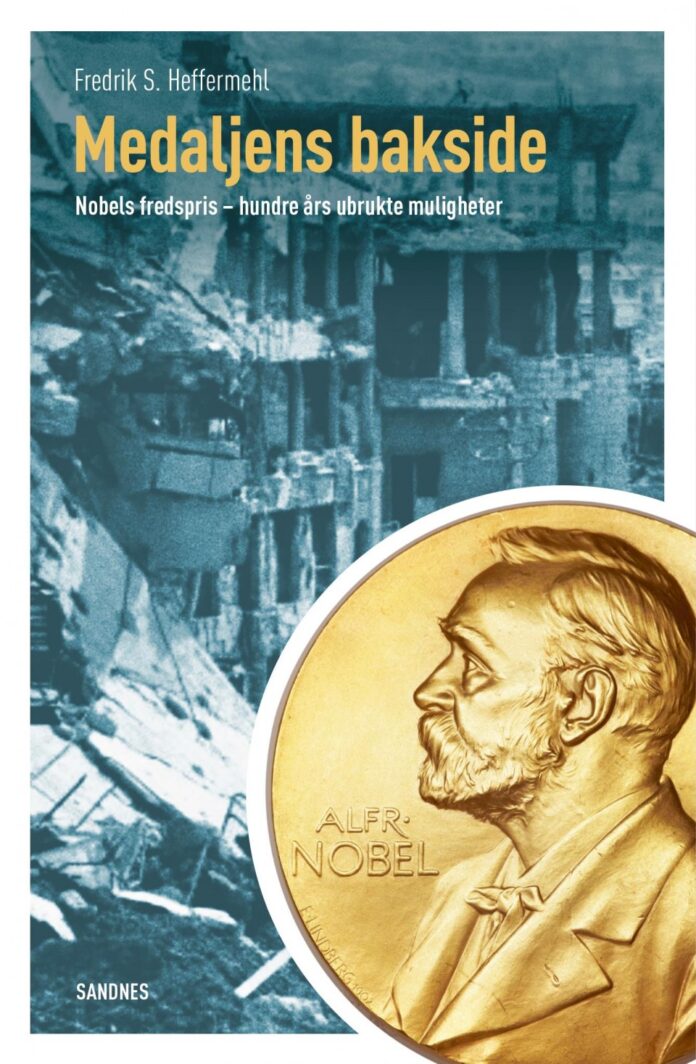(THIS ARTICLE IS MACHINE TRANSLATED by Google from Norwegian)
The book is 425 pages, divided into three: "In Search of the Lost Vision", "Does the Nobel Prize have the potential to change the world?" and "Who Should Have Won the Peace Prize 1901–2019?".
I open Back of medal with anticipation and hope – can the book help save our only planet? Yes, with this great work on the history of the Peace Prize, Heffermehl comes both with new knowledge and inspiration to all anti-war and peace activists, and with a strong appeal to gather to stop a third world war, which may be the last.
In the first part of the book, Heffermehl analyzes his way to the Nobel intention with the Peace Prize, by studying the time he lived in, his environment and circle of friends. Foremost among them is Bertha von Suttner, whose book Down with the weapons affected the whole world. She describes war propaganda as an important part of the war preparations, as rivalry between the great powers was a triggering cause of the First World War. After the Crimean War, a peace movement emerged to stop all war, and Suttner asked Alfred Nobel for support. Heffermehl writes "it was a matter of preventing, not making the wars more humane or providing humanitarian aid to the victims". He concludes that there was work for disarmament Nobel would support when he established the Peace Prize. Not to make the war more humane, but to abolish war!
Heffermehl shows how badly Norway has since managed this honorable position.
It was Nobel himself who asked the Norwegian Storting to award the Peace Prize – the most important of the five prizes he established – when the Storting was particularly active in peace work in the 1890s.
Heffermehl shows how badly Norway has since managed this honorable position. From the beginning, the committee failed to comply with the intention of the Nobel will. They have used the award to promote cases unrelated to or contrary to the Nobel will. Often based on the Storting's political line, or dominated by US foreign policy after joining NATO. According to Heffermehl, the committee acted directly unlawfully by awarding the Peace Prize to Kissinger and Obama: "The Nobel Prize has been adapted to Norwegian politics instead of the other way around."
Peace education
When asked about the Peace Prize's potential to change the world, Heffermehl himself answers in the second part of the book: "Norway can change the course of history by being inspired by Suttner and Nobel and take the initiative for a 'brotherhood of nations' in peaceful and disarmed cooperation." He writes that “the committee should also have promoted peace education. Peace must begin with the young, ”which could have created hope and faith in the future. He emphasizes the illogicality of the fact that emissions from the war industry and acts of war are excluded from the climate accounts. Nothing will be able to pollute more than the use of nuclear weapons.
In the third part of the book, Heffermehl gives an overview of Nobel Committees composition and all awards of the Peace Prize. He shows who received the award in accordance with the Nobel intention, and who received it without deserving it. He also highlights with mention and photo those he thinks should have been awarded the prize. For example, since the US atomic bombing of Hiroshima and Nagasaki in 1945, many have worked for a ban on nuclear bombs – without receiving the award.
"Our culture is so militarized into the spinal cord that peace work can be kept invisible"
Heffermehl shows the danger of a culture of war that has greatly contributed to plunging us into two world wars. This still dominates us today. "Our culture is so militarized into the spinal cord that peace work can be kept invisible," he claims.
Children and young people play violent computer games, the media spews out war propaganda, enemy images and threats, now also threats of nuclear bomb attacks. Heffermehl warns: This massive influence makes us see outbreaks of war as inevitable, and creates apathy and passivity.
The obligation
In 2017, the Nobel Committee fulfilled the Nobel's intention by awarding the Peace Prize ICAN, which attracted worldwide attention and hope. The Norwegian Prime Minister showed a frightening cynicism here by claiming that we as a NATO member can not support the ban on nuclear weapons.
It can also be argued that by dropping bombs on land that has never threatened or attacked us, Norway is given a deserved place among the world's self-righteous hypocrites.
Heffermehl emphasizes that a Nobel Committee selected on the basis of competence and willingness to follow the Nobel intention would provide strong support for anti-war work around the world: "Norwegian politicians' obligation is to promote the Nobel peace idea or give up the mission."
Back of medal is a warning that requires to be taken seriously. It inspires a worldwide anti-war movement, necessary for our survival.






